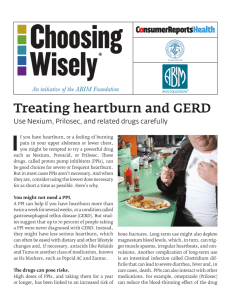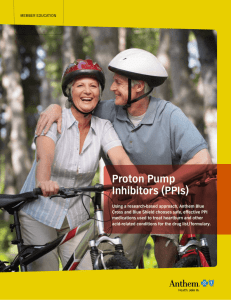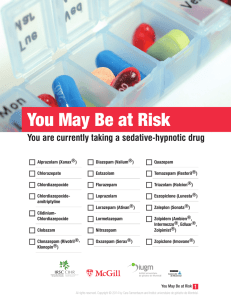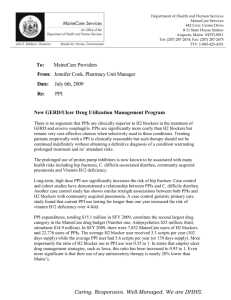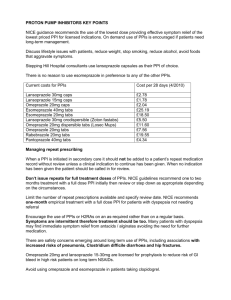Proton Pump Inhibitors De-prescribing Brochure
advertisement
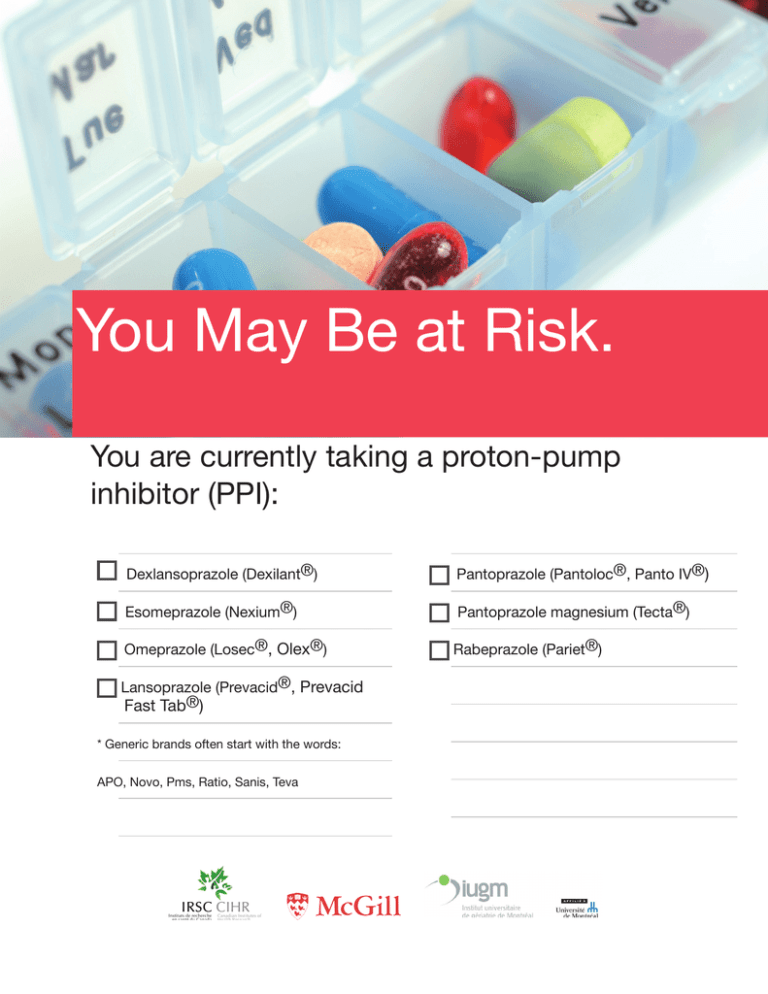
You May Be at Risk. You are currently taking a proton-pump inhibitor (PPI): Dexlansoprazole (Dexilant®) Esomeprazole (Nexium®) Omeprazole (Losec®, Olex®) Lansoprazole (Prevacid®, Prevacid Fast Tab®) * Generic brands often start with the words: APO, Novo, Pms, Ratio, Sanis, Teva Pantoprazole (Pantoloc®, Panto IV®) Pantoprazole magnesium (Tecta®) Rabeprazole (Pariet®) TEST YOUR KNOWLEDGE about PPIs 2 You May Be at Risk. All rights reserved. Copyright © 2014 by Cara Tannenbaum and Institut universitaire de gériatrie de Montréal. Copyright licenses available upon request. TEST YOUR KNOWLEDGE 1 PPIs are sometimes prescribed for heartburn and acid reflux. TRUE FALSE 2 More than half of all the persons taking PPIs probably do not need them. TRUE FALSE 3 There are no risks involved in taking PPIs. TRUE FALSE 4 PPIs are the best option to treat occasional hearburn. TRUE FALSE You May Be at Risk. 3 All rights reserved. Copyright © 2014 by Cara Tannenbaum and Institut universitaire de gériatrie de Montréal. Copyright licenses available upon request. ANSWERS 4 You May Be at Risk. All rights reserved. Copyright © 2014 by Cara Tannenbaum and Institut universitaire de gériatrie de Montréal. Copyright licenses available upon request. ANSWERS 1 TRUE Proton pump inhibitors (PPIs) are sometimes prescribed to treat heartburn and acid reflux. Proton pump inhibitors reduce the production of acid in the stomach. The stomach produces acid to help break down food, but sometimes the acid can irritate the stomach and cause problems. 2 TRUE To treat occasional heartburn, it is recommended to take Tums® or Rolaids® as needed. Should your condition require you to take a PPI, your physician should start at the lowest dose possible for as short a time as possible. 3 FALSE PPIs interact with some common prescription drugs, like bloodthinning medication. Taking a PPI for longer than 4-8 weeks has been linked to: • a higher risk of hip fracture; • low levels of magnesium in your blood, causing shaking, muscle cramps and irregular heartbeats; • pneumonia; • an infection with the bacteria Clostridium difficile, which can lead to severe diarrhea, fever, and, in rare cases, death. 4 FALSE PPIs are powerful drugs. If you have heartburn every now and then, you probably do not need a PPI. Over-the-counter antacids could be sufficient. You can ease heartburn without drugs. This brochure explains how. You May Be at Risk. 5 All rights reserved. Copyright © 2014 by Cara Tannenbaum and Institut universitaire de gériatrie de Montréal. Copyright licenses available upon request. DID YOU KNOW? Proton pump inhibitors (PPIs) reduce the production of acid in the stomach. The stomach produces acid to help break down food, but sometimes the acid can irritate the stomach and cause problems. PPIs, unlike antacids such as Rolaids® , Tums® or Maalox®, are powerful drugs. Both PPIs and antacids keep the stomach from making too much acid. PPIs are available only under prescription. If you have GERD (gastroesophaegal reflux disease), peptic ulcers (H. pylory type) or if you have been taking a non-steroidal anti-inflammatory drug or aspirin, your doctor may have prescribed a PPI. Studies show that PPIs can be linked to serious health issues like an increased risk of hip fracture and infection from C. difficile bacteria, especially if they are taken over a long period of time. PPIs can change the way other drugs work. For example, they can reduce the blood-thinning effect of the drug (Plavix®). This can increase the risk of heart attack and even death. Usually, your pharmacist will take care of this interaction. When you need a PPI, you should take the lowest dose for as short a time as possible. If your doctor thinks you need a PPI, ask to start with the lowest dose possible. Consult your Doctor or Pharmacist Before Stopping Any Medication 6 You May Be at Risk. All rights reserved. Copyright © 2014 by Cara Tannenbaum and Institut universitaire de gériatrie de Montréal. Copyright licenses available upon request. SO ASK YOURSELF... yes or no? ... have I been taking a PPI every day for more than 8 weeks? ... do I feel heartburn only from time to time, like after a big meal? ... am I taking other drugs that can interact with the PPI? AS YOU AGE Age-related changes take place in your body and modify the way you process medications. Your chances of taking more than one medication increase as you age, as well as the possibility of a history of illness. Drugs stay in your body longer and diminished liver function and poor blood flow to your kidneys may increase side effects. Unfortunately this is important information that is often not passed on to patients who are taking this drug. Please consult your physician or pharmacist to discuss this further. Alternative therapies could relieve heartburn and acid reflux with less risk to your health. You May Be at Risk. 7 All rights reserved. Copyright © 2014 by Cara Tannenbaum and Institut universitaire de gériatrie de Montréal. Copyright licenses available upon request. ALTERNATIVES Most people who have heartburn do not need drugs at all. Like them, you could feel better by making simple changes in your diet and lifestyle. Try these alternatives instead of taking a PPI: • Watch what you eat. Try to figure out which food or beverage triggers your heartburn. You might want to avoid: • alcohol • fried food or junk food • spicy food • garlic and onions • citrus fruits • chocolate and peppermint • beverages that contain caffeine • food with lots of tomatoes • Eat smaller meals. • Do not eat before going to bed. You could also lie with your head raised up by using extra pillows. • Stop smoking. Studies show that smoking raises your risk for heartburn and acid reflux (or GERD). • Lose weight. Studies show that just by dropping a few pounds, you could reduce heartburn and acid reflux. • Do not wear tight clothes. The added pressure from tight fitting clothes that constrict your abdomen can make heartburn worse. 8 You May Be at Risk. All rights reserved. Copyright © 2014 by Cara Tannenbaum and Institut universitaire de gériatrie de Montréal. Copyright licenses available upon request. MR. TREMBLAY’S STORY He was taking a proton pump inhibitor (PPI) to relieve heartburn. He was taking Nexium®. "I am 65 years old and had been taking Nexium® for at least 2 years to relieve heartburn. Recently, I was hospitalized for a pneumonia. At my next medical follow-up, my doctor suggested I stop taking Nexium® as new guidelines show that taking a PPI for more than 8 weeks could be linked to pneumonia. Furthermore, my doctor told me it could also interfere with the osteoporosis drug I am now taking. I took his advice. Now when hearburn occurs every now and then, I take Tums® and it does the job. I also made lifestyle changes. I stopped smoking and I lost a few pounds. Not only did my heartburn almost disappear, but these changes are having a very positive impact on my overall health. When I know I will have a big meal, I try to avoid foods that can cause heartburn. I do not drink coffee, I limit my consumption of alcohol, and I go out for a walk before going to bed. I know PPI drugs, like Nexium®, are powerful drugs that have side effects. So I trust my doctor to prescribe them only when appropriate and at the smallest dose possible." You May Be at Risk. 9 All rights reserved. Copyright © 2014 by Cara Tannenbaum and Institut universitaire de gériatrie de Montréal. Copyright licenses available upon request. TAPERING SCHEDULE If you have been taking PPIs for awhile, your stomach has probably gotten used to their effect. Suddenly stopping PPIs can lead to rebound acidity and worsening symptoms. It is therefore recommended to slowly taper PPIs over 4 weeks prior to stopping. First reduce your dose in half for 2 weeks. If you have capsules that cannot be broken in half, skip a capsule every second day. Another option is to have your physician write a new prescription for only half the dose and for you to take these for 2 weeks. Repeat for the second 2 weeks (quarter dose). Then stop. In order to select the best option for you, make sure you discuss this with your doctor or pharmacist. Buy some Tums®, Rolaids®, or Maalox® and use as needed if required. CONSULT YOUR DOCTOR OR PHARMACIST BEFORE DECIDING TO TAPER. YOU MAY BE ON STEROID MEDICATION OR OTHER ANTIINFLAMMATORY DRUGS OR ASPIRIN THAT REQUIRE YOU TO STAY ON PPIs OR SWITCH TO ANOTHER STOMACH PROTECTIVE AGENT. 10 You May Be at Risk. All rights reserved. Copyright © 2014 by Cara Tannenbaum and Institut universitaire de gériatrie de Montréal. Copyright licenses available upon request. IF YOUR OPTION IS TO REDUCE THE DOSE: WEEKS TAPERING SCHEDULE MO TU WE TH FR SA SU 1 2 3 4 IF YOUR OPTION IS TO SKIP A CAPSULE EVERY SECOND DAY: WEEKS TAPERING SCHEDULE MO TU WE TH FR SA SU 1 2 3 4 You May Be at Risk. 11 All rights reserved. Copyright © 2014 by Cara Tannenbaum and Institut universitaire de gériatrie de Montréal. Copyright licenses available upon request. Please Consult your Doctor or Pharmacist Before Stopping Any Medication 12 You May Be at Risk. All rights reserved. Copyright © 2014 by Cara Tannenbaum and Institut universitaire de gériatrie de Montréal. Copyright licenses available upon request.

